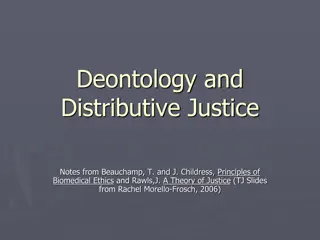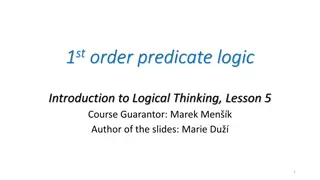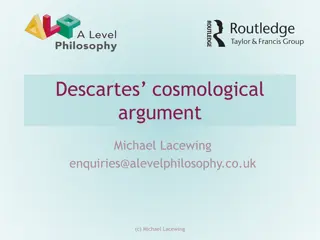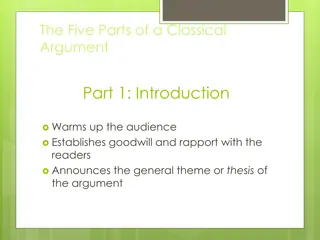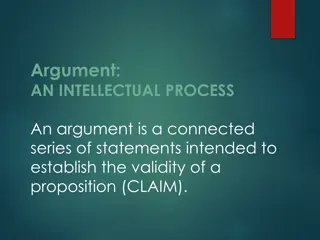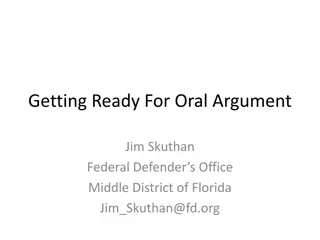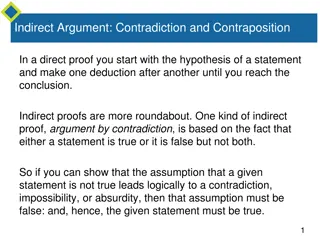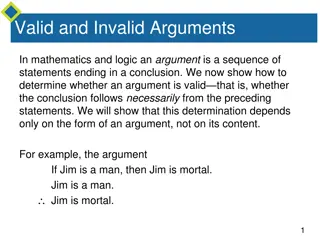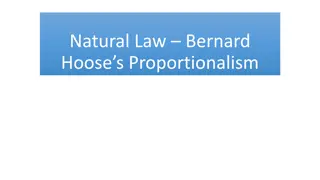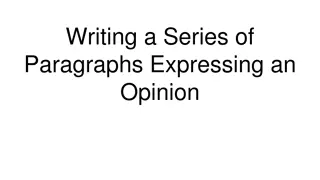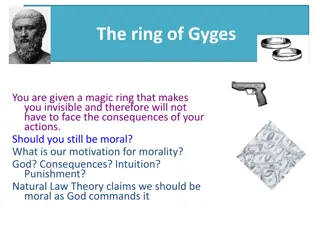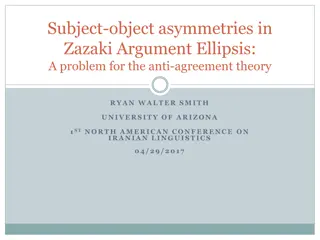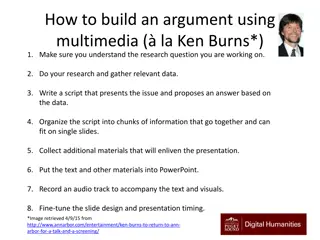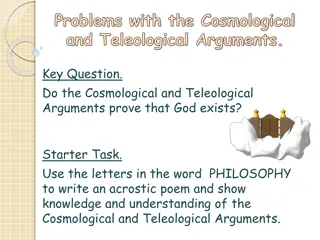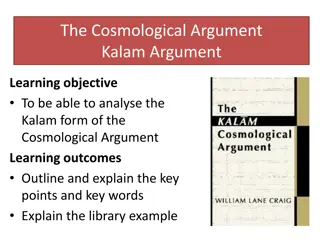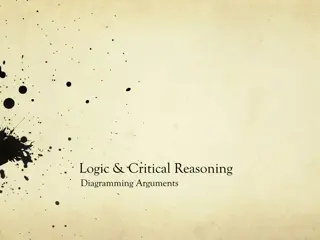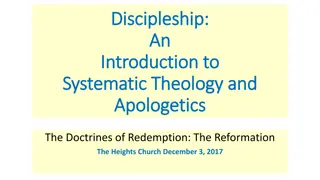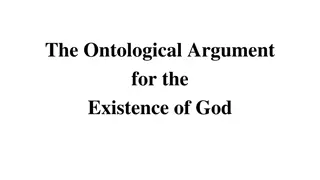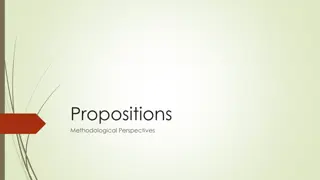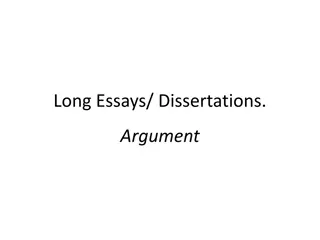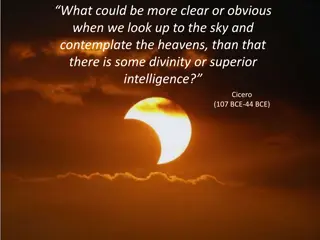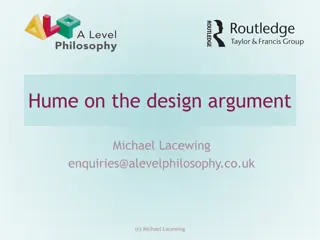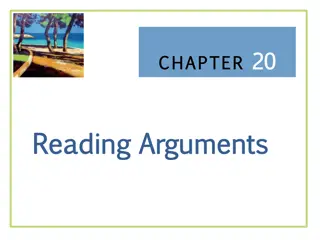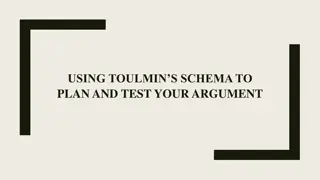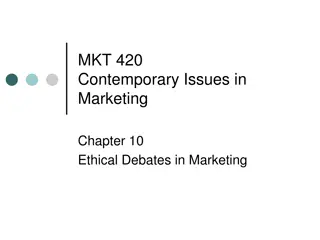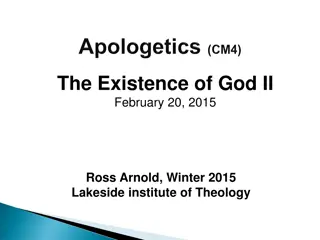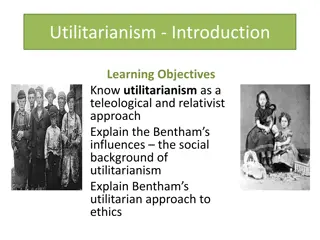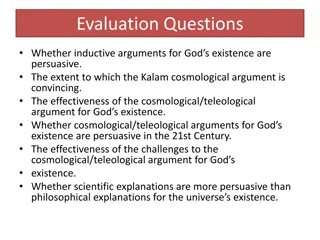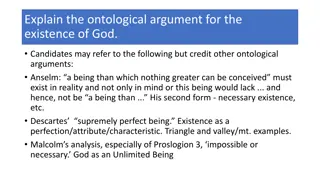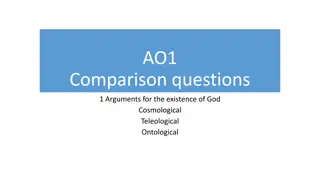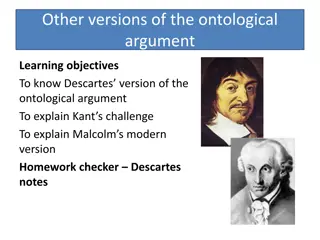The Semantic Argument for the Existence of God - International Conference Insights
Explore the Semantic Argument and its implications for the existence of God as presented by Emanuel Rutten at the International Proofs of God's Existence Conference. The lecture delves into universal properties, formal versus non-formal properties, and the likelihood of God's existence based on thes
0 views • 14 slides
Approaches in Studying Human-Environment Relationship
Explore different approaches to understanding the dynamic relationship between humans and their environment, including deterministic, teleological, possibilistic, and economic deterministic perspectives. These approaches shed light on how human actions and interactions with the environment have evol
1 views • 9 slides
Understanding Deontology and Distributive Justice in Ethics
Deontology, originating from the Greek words for duty and study of, focuses on morally required, forbidden, or permitted choices. It emphasizes obedience to duty and opposes utilitarianism, prioritizing what is morally right over the overall good. Unlike virtue theories, deontology assesses moral ob
2 views • 32 slides
Exploring Ethics: Branches, Theories, and Moral Dilemmas
Ethics delve into Meta Ethics, Normative Ethics, and Applied Ethics to understand moral concepts and decision-making. The discourse covers various ethical theories like Absolutism, Relativism, Subjectivism, and explores the difference between Teleological and Deontological decision-making. Thought-p
5 views • 14 slides
Coherence and Cohesion
Cohesion and coherence play crucial roles in academic writing by ensuring logical flow and connection between ideas. Cohesion involves linking sentences using devices like conjunctions, pronouns, and repetition, while coherence focuses on organizing ideas into paragraphs that logically develop the a
0 views • 13 slides
Introduction to 1st Order Predicate Logic in Logical Thinking
Explore the limitations of propositional logic and the enhanced expressive power of 1st order predicate logic (PL1). Understand how PL1 allows for analyzing the structure of atomic propositions and proving arguments that depend on these structures. Through examples and valid argument schemata, delve
1 views • 26 slides
Descartes' Cosmological Argument and Existence Inquiry
Descartes presents a cosmological argument questioning the existence of anything, focusing on what causes his own existence. He explores different aspects such as perfection, dependency, and the idea of God as a necessary cause for existence. Challenges about the nature of continued existence are al
0 views • 17 slides
Understanding the Five Parts of a Classical Argument
The classical argument is composed of five main parts: Introduction, Narration, Confirmation, Refutation and Concession, and Summation. Each part plays a crucial role in presenting a well-structured and persuasive argument, with devices and strategies such as diction, syntax, and figurative language
0 views • 6 slides
Year 5 English Home Learning - Spelling and Balanced Argument Activities
Explore Year 5 English home learning activities for the week, including a spelling lesson using Oxford Owl, practicing challenging words, and planning a balanced argument on whether mobile phones should be allowed in school. Enhance your spelling skills and critical thinking through engaging tasks a
1 views • 20 slides
Understanding the Key Elements of an Argument
An argument is an intellectual process that involves a series of connected statements to establish the validity of a proposition. This process typically includes elements such as a hook, claim, support with reasons and evidence, and counterclaims with concessions and refutations. Each element plays
0 views • 13 slides
Preparing for Oral Argument in the Eleventh Circuit: Essential Tips
Understand the process of oral arguments in the Eleventh Circuit, including when to request oral argument, FRAP 34 guidelines, and how to handle the notice of oral argument. Get insights on making the most of oral argument opportunities and potentially shaping circuit law.
0 views • 32 slides
Understanding Indirect Proofs: Contradiction and Contraposition Examples
Indirect proofs offer a roundabout approach to proving statements, with argument by contradiction and argument by contraposition being the main techniques. Argument by contradiction involves supposing the statement is false and deriving a contradiction, while argument by contraposition relies on the
1 views • 18 slides
Understanding Valid and Invalid Arguments in Mathematics and Logic
In mathematics and logic, determining the validity of an argument depends on its form rather than its content. An argument is considered valid if the conclusion necessarily follows from the premises. This determination involves analyzing the abstract form of the argument, constructing truth tables t
0 views • 32 slides
Understanding Bernard Hoose's Proportionalism in Natural Law Theory
Bernard Hoose's Proportionalism presents a modern take on Natural Law theory, offering a hybrid approach that considers teleological perspectives. Proportionalism acknowledges certain acts as inherently wrong but allows for exceptions based on proportionate reasons. This flexible framework operates
5 views • 18 slides
Should Students Have Homework? Crafting a Persuasive Argument
Crafting a persuasive argument on the topic of whether students should have homework, this piece presents a well-structured approach for expressing an opinion effectively. It guides the reader through forming an introduction with a clear position, developing supporting points in body paragraphs, and
0 views • 10 slides
Understanding Natural Law Theory: Morality and Divine Commands
Natural Law Theory, influenced by thinkers like St. Thomas Aquinas and Aristotle, posits that morality is derived from rational thought and divine commands. The theory emphasizes the importance of following moral absolutes to establish a right relationship with God and achieve eternal life. By study
1 views • 36 slides
Understanding Reasonable Arguments vs. Pseudo-Arguments
The provided content focuses on distinguishing between reasonable arguments and pseudo-arguments through thought-provoking questions such as the ethical treatment of animals, city subsidies for sports venues, and subjective opinions on aesthetics. It also explains the structure of an argument, highl
0 views • 18 slides
Subject-Object Asymmetries in Zazaki Argument Ellipsis
Many languages allow argument ellipsis (AE), where an argument can be omitted for sloppy or quantificational interpretations. Subject-object asymmetries arise in languages due to subject-verb agreement. This study presents evidence from Zazaki, a Northwestern Iranian language, challenging the anti-a
0 views • 28 slides
Creating a Persuasive Multimedia Argument
Harness the power of multimedia, following a comprehensive process similar to Ken Burns, to build a compelling argument by understanding the research question, conducting thorough research, scripting the issue with data-backed answers, organizing information effectively, incorporating additional mat
0 views • 12 slides
Exploring Problems with Cosmological and Teleological Arguments
Dive into the challenges faced by the Cosmological and Teleological Arguments in proving the existence of God. Explore key questions, acrostic poems, lesson outcomes, and activities to deepen your understanding of these philosophical concepts. Discover how scientific theories like the Big Bang Theor
0 views • 6 slides
Understanding the Kalam Argument in the Cosmological Debate
The Kalam Argument, a form of the Cosmological Argument, asserts that everything with existence has a cause, including the universe. Developed by thinkers like al-Kindi, al-Ghazali, and William Lane Craig, it aims to prove that God was the initial cause of the universe. This argument suggests that t
0 views • 17 slides
Exploring Argument Structure and Diagramming in Critical Reasoning
Understanding the two types of argument structures - atomic and complex, with examples and diagrams. Learn how argument diagrams visually represent the structure of an argument, identify significant units like premises and conclusions, and distinguish main conclusions from sub-conclusions. Dive into
1 views • 10 slides
Integrating Aristotle with Christianity: The Impact of Thomas Aquinas
The integration of Aristotelian philosophy into Christian theology by Thomas Aquinas in the 13th century had significant implications, enriching Christian scholarship and influencing key doctrines such as grace, predestination, and the existence of God through the teleological argument. Despite cont
0 views • 7 slides
Understanding Anselm's Ontological Argument for the Existence of God
Anselm's Ontological Argument posits that the greatest possible being, referred to as God, must exist in reality because existing in reality is greater than existing only in thought. This argument centers on the concept of necessary vs. contingent beings and the idea that the greatest being cannot e
0 views • 32 slides
Understanding Propositions: Methodological Perspectives and Argument Structure
Explore the concept of argument structure, propositions, and states of affairs within sentence meaning. Learn about different types of propositions based on verb relations and delve into event and state propositions. Understand how propositions can take various grammatical forms and their significan
0 views • 19 slides
Mastering the Art of Argument in Essay Writing
Embrace the challenges of essay writing by understanding the essence of crafting a strong argument. Learn how to structure your thoughts logically, present evidence convincingly, and engage your readers effectively. Discover the importance of argument in various fields of life and the vital role it
0 views • 20 slides
Contemplating the Divine: Teleological Arguments for Intelligent Design
When gazing at the heavens, the eloquent words of Cicero and the insights of Sir Isaac Newton and William Paley prompt contemplation on the existence of a divine or intelligent force shaping the universe. The discussion delves into teleological arguments, highlighting the order and design observed i
0 views • 9 slides
Analyzing Hume's Critique of the Design Argument by Michael Lacewing
The design argument contends that the intricate order in the universe suggests a designer. Michael Lacewing delves into Hume's objections to this argument, highlighting how the analogy between human-made objects and the universe falls short in establishing a similar cause. Hume questions the logic o
0 views • 10 slides
Understanding the Basic Components of an Argument
This chapter delves into the fundamental aspects of constructing and analyzing arguments. It explores the elements of an argument, such as the issue, claim, support, and refutation. Through readings on organ donation and tipping, it guides readers on actively engaging with and critically evaluating
1 views • 15 slides
Using Toulmin's Schema to Plan Effective Arguments
Explore how Carmen applies Toulmin's schema to craft a compelling argument about the benefits of girls playing first-person-shooter video games. Her reasoning, grounded in personal experiences and societal perceptions, demonstrates the intricate planning required to support each claim effectively. B
0 views • 10 slides
Exploring Marketing Ethics and Theoretical Frameworks
This chapter delves into the complex realm of marketing ethics, examining definitions, standards of conduct, and ethical debates prevalent in the marketing industry. It tackles the scope and role of marketing ethics, along with specific ethical topics such as societal impact, decision-making models,
0 views • 12 slides
Philosophical Apologetics: Arguments for the Existence of God
Philosophical apologetics presents various arguments for the existence of God, including the ontological, cosmological, teleological, moral, transcendental, and presuppositional arguments. These arguments cover diverse aspects such as change, causality, design, contingency, miracles, consciousness,
0 views • 10 slides
Understanding Utilitarianism: Bentham's Moral Philosophy
Utilitarianism, a teleological and relativist ethical theory created by Jeremy Bentham, focuses on maximizing happiness and minimizing pain for the greatest number of individuals. Bentham's Act Utilitarianism emphasizes the principle of utility and uses the hedonic calculus to measure pleasure. This
0 views • 20 slides
Understanding SDSU's Writing Placement Assessment (WPA)
SDSU's GWAR, an argument-based Writing Placement Assessment, requires students to write an essay analyzing a given argument. Scores range from 2-10, with different score bands dictating course requirements. Achieving a perfect score is subjective, emphasizing clear and concise argument analysis. Som
0 views • 35 slides
Evaluating Arguments for God's Existence in the 21st Century
Exploring the persuasiveness of inductive arguments for God's existence, assessing the Kalam cosmological argument, and evaluating the effectiveness of cosmological/teleological arguments. Delving into whether scientific explanations surpass philosophical ones, the strengths and weaknesses of these
0 views • 16 slides
Ontological Argument for God's Existence and Challenges
The ontological argument posits that a being than which nothing greater can be conceived must exist in reality, not just in the mind. Critics challenge this argument, citing issues with defining God and debating whether existence can be a characteristic. Gaunilo and Kant present criticisms focusing
0 views • 30 slides
Comparison of Arguments for the Existence of God
The comparison explores the Cosmological, Teleological, and Ontological arguments for the existence of God. It delves into the similarities and differences between key proponents such as Aquinas, Paley, William Lane Craig, and Tennant. Each argument is examined based on its form, empirical evidence,
0 views • 10 slides
Exploring Different Versions of the Ontological Argument
This content delves into various versions of the ontological argument, including Descartes' and Kant's perspectives. Descartes sought to prove God's existence through reason alone, emphasizing the innate conception of a supremely perfect being. The challenges posed by Kant and Malcolm to this argume
0 views • 24 slides
Forms of Moral Reasoning and Ethics in Decision-Making
Explore the main forms of moral reasoning in ethical decision-making, including virtue ethics, deontological reasoning, and teleological reasoning. Understand the importance of developing ethical virtues and principles in guiding behavior. Delve into examples of reasoning from virtue and deontologic
0 views • 28 slides
Understanding Natural Law Theory and Moral Principles
Natural Law theory is based on the idea that the good aligns with fundamental design, prescribing moral behavior. Rooted in Aristotle's teleological view, it encompasses concepts like Aquinas' hierarchy of laws and natural inclinations. Qualifying principles such as the Doctrine of Double-Effect gui
0 views • 17 slides


